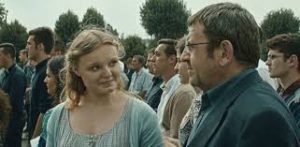SCHOOL DAZED: Movie review of Graduation by Howard Casner
Posted: April 29, 2017 | Author: Donald | Filed under: Uncategorized | Tags: 12:08 East of Bucharest, 2 Days, 3 Weeks, 4 Months, Adjective, Adrian Titieni, California Dreaming’, Cristian Mungui, Graduation, Police, The Death of Mr. Lazarescu, Vlad Ivanov | 5 Comments » First, a word from our sponsors: I am now offering a new service: so much emphasis has been given lately to the importance of the opening of your screenplay, I now offer coverage for the first twenty pages at the cost of $20.00. For those who don’t want to have full coverage on their screenplay at this time, but want to know how well their script is working with the opening pages, this is perfect for you. I’ll help you not lose the reader on page one.
First, a word from our sponsors: I am now offering a new service: so much emphasis has been given lately to the importance of the opening of your screenplay, I now offer coverage for the first twenty pages at the cost of $20.00. For those who don’t want to have full coverage on their screenplay at this time, but want to know how well their script is working with the opening pages, this is perfect for you. I’ll help you not lose the reader on page one.
Ever wonder what a reader for a contest or agency thinks when he reads your screenplay? Check out my new e-book published on Amazon: Rantings and Ravings of a Screenplay Reader, including my series of essays, What I Learned Reading for Contests This Year, and my film reviews of 2013. Only $2.99. http://ow.ly/xN31r
and check out my Script Consultation Services: http://ow.ly/HPxKE
Warning: SPOILERS
 Romanian writer/director Cristian Mungui seared himself upon the eyes of American moviegoers with the breathtaking and powerful drama 4 Months, 3 Weeks, 2 Days, an explosive chronicle of someone helping a friend get an abortion under the ruthless Communist dictatorship of Ceausescu.
Romanian writer/director Cristian Mungui seared himself upon the eyes of American moviegoers with the breathtaking and powerful drama 4 Months, 3 Weeks, 2 Days, an explosive chronicle of someone helping a friend get an abortion under the ruthless Communist dictatorship of Ceausescu.
That film, along with others like The Death of Mr. Lazarescu, 12:08 East of Bucharest, California Dreaming’ and Police, Adjective, cemented Romania, along with South Korea, as the countries that are making the best films in the world right now.
Mungui’s new film is Graduation, and it’s marvelous. The story revolves around Romeo, a respected doctor known for not breaking the law or rules. But when his daughter is attacked and becomes distracted, he is willing to do anything he can to make sure she finishes her final exams with high enough scores so she can get a scholarship to Cambridge.
Movie Review of CHILD’S POSE by Howard Casner
Posted: March 3, 2014 | Author: Donald | Filed under: Uncategorized | Tags: Bogdan Dumitrache, Calin Peter Netzer, Child’s Pose, Luminita Gheorghiu, Razvan Radulescu, Vlad Ivanov | 1 Comment »The camera is hand held; the colors are muted; the subject matter is edgy, personal, biting, vicious even. It must be Romanian new wave time.
Ever since France came up with that term in the 1950’s to describe the rise of a new generation of filmmakers who were often defined in their rebellion of their predecessors, everyone keeps looking for that new wave, like a surfer jonesing to find a heretofore unknown location to hang ten before anyone else comes along to find it first.
The wave soon traveled from the land of wine and brie to Germany and then started traveling around the world (the U.S. had theirs in the 1960’s and ‘70’s), leapfrogging from country to country, turning critics into a frenzy as they tried to be the first to discover where the next break out was going to be.
The definition even became a little vague. It no longer had to be defined by rebellion against what had come before. It just became a term used to describe a location where suddenly, for whatever reason, a group of exciting new artists emerged at the same time, no matter the reason.
It kept going and going and going until France even had a second one. And it hasn’t stopped.
The down side to this is that countries and filmmakers basically become flavors of the month and can be as quickly dismissed as they were discovered when that new brand comes out (a fifteen minute fame variation thingy). You can even feel it in the air as critics once again become feral trying to be the first ones to find that new flavor before it hits the market.
The up side to this is that new waves are where the future is. It’s these artists who give new life to a dying art. They are the phoenix in the fire.
So I don’t really care why they exist or who finds them, I’m just glad they’re there.
And now we have South Korea and Romania, which are the two countries where the most exciting and challenging films are being made right now. And where South Korea has been more technically polished and genre/pop culture oriented, Romania has taken the more neo-realist, dogma road.
And hence the hand held, muted colors, edgy, personal, biting, vicious comment. Even in Romania the comedies tend to take no prisoners.
It’s a little early for Momma’s Day, perhaps, but Child’s Pose is the new mother/son film from writers Razvan Radulescu (who also co-wrote the powerful The Death of Mr. Lazarescu and consulted on 4 Months, Three Weeks, Two Days—two of the most important films of that country’s new wave) and Calin Peter Netzer (who also directed).
On the surface, it’s about a man who kills a teen in an unfortunate car accident and how his mother tries to help him out of the difficult situation.
I say “on the surface”, though, cause I ain’t quite sure that’s really what it was all about.
You see, this mother, Cornelia, is, well, shall we say, uh, a bit…overbearing when it comes to her son Barbu. I mean, she doesn’t approve of the woman he’s living with and wants them to break up; she is not above using their maid (who is also her maid) to spy on the couple; and she is also not above using that horrible accident Barbu was involved in as a way to manipulate him into moving back in to his old room in her and her husband’s apartment.
She’s certainly not Medea; she’s not even Joan Crawford. But there’s just something a little off about her that is more than a bit unsettling.
Her son Barbu (played by a smoldering Bogdan Dumitrache), on the other hand, has a great deal of anger against mommie dearest, yelling at her and cursing her (and I mean, cocksucker, motherfucker cursing, not the, I’m going to hold my breath until I turn blue, you old meanie, cursing). He not only does whatever he can to not see her, he resents every effort she makes in order to help him stay out of jail.
At first glance Barbu seems an ungrateful little douchebag of a son who doesn’t deserve the mother he has. But at the same time, his anger is so deep, so out of proportion, so over the top, that after awhile I felt that there was an elephant in the room, something that was not being said, some issue that was driving it all that no one was revealing.
And Barbu does act as if Cornelia should understand exactly why he treats her the way he does, though Cornelia reacts as if she has no idea.
And, you know, there was that one moment where Cornelia gives Barbu a back massage that starts to grow a bit too intimate, a bit too, but not quite, below the belt (if you get my drift), a bit too creepy. But is that it? Is that the big secret everyone is not talking about?
I really can’t say. I mean, I have to be honest, I truly have no idea. I don’t have a clue as to what was really going on.
At the same time, I didn’t care. I was simply too engrossed in the family dynamics; the dysfunctional chaos driving everything; the deep and vibrant character study of people in a post-Communist, post-Ceausecu Romania.
I didn’t know why they were acting the way they were, I just knew I couldn’t stop watching them until the end where both finally break free of whatever conflicts the two have and realize that perhaps the world is not about them and they are not the center of the universe.
This part of the journey begins after the aforesaid accident where it soon becomes apparent that the approach to crimes like this in Romania may not be quite what it is here. No one is that interested in the right or wrong of the matter. No one is even that interested in justice.
In fact, instead of trying to get things resolved though a police investigation that ends up in court, the police, the parents, Barbu, a witness, everybody tries to settle everything through, shall we say, other methods.
The police advise Cornelia and Barbu to visit the parents and pay for the funeral. Cornelia and Barbu get their own expert blood tests. Cornelia is also encouraged to visit the only witness, the driver of a car Barbu was trying to pass, to see if he’ll reconsider his version of events (no, that’s actually a euphemism; it’s if he’ll accept a bribe and how much is that bribe going to be, with the witness being played by the wonderful Vlad Ivanov, the abortionist of 4 Weeks, 3 Months, 2 Days and rigid captain of Police, Adjective, here at his slimy best); and it’s a euphemism that no one, not even the police, really think is all that questionable.
None of this has anything to do with whether Barbu is guilty, but just whether everything can be done away with before the justice system becomes involved. The dead teen becomes chopped liver, an inconvenient stumbling block that needs to be gotten rid of as carefully and diplomatically as possible, not just by Cornelia, but by the police.
And then both Cornelia and Barbu go to visit the parents. At first Barbu refuses to go in. In his defense, he is so upset over what he did that he can’t bear to face the parents. But Cornelia does.
And she begs for her son and for their forgiveness, asking them to let her son go. And as she begs, she begins to realize the horror of what has happened. That someone has died. That another mother’s child is no longer on this earth. And that her own son’s future is at stake. It’s a breathtaking scene, riveting and emotionally devastating.
Cornelia is played by Luminita Gheorghiu, the great actress who seems to have appeared in every other film of the Romanian new wave, from 4 Weeks…, to The Death of Mr. Lazarescu to 12:08 From Budapest. Here she gives a deeply felt and powerful performance of a mother wiling to do anything for her son, even if it’s to stop being a monster for just a little while.
And it’s a movie that leaves you deeply affected.
So, okay, yeah, maybe it is only a passing fancy and Romania’s new wave will soon give way to the next. Some people are betting on Chile. Others on some other Eastern European country. Who knows? I don’t.
I just wish the U.S. would have one.











